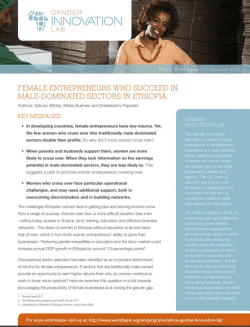
Policy highlights:
- In Ethiopia, the share of women without education is almost twice that of men. Reducing gender inequality in education and the labour market could increase annual GDP growth by 1.9%. The question is why don’t women entrepreneurs cross over to male-dominated sectors, like construction, tourism and metal works, when they could make a much larger profit than in their current business?
- A study of 790 female entrepreneurs in urban Ethiopia confirmed that, in general, cross-over businesses are larger and make greater profits than other businesses. Specific challenges faced by women entrepreneurs who do cross over include: 1) harassment and discrimination and 2) problems accessing and building useful networks. Access to finance is a challenge for women in both crossover and non-crossover businesses. Their entrepreneurial abilities are balanced across sectors.
- The choice to cross over usually depends on: 1) spousal support (the woman’s spouse owning a business or offering opportunities), 2) parental influence (mainly through parents’ own occupational choices), and 3) overcoming information barriers on profitability of crossing over.
- Policymakers should focus on: 1) improving education on sector profitability through schooling, work or apprenticeships and raising awareness on successful women business owners, 2) engaging men, 3) supporting women to establish business networks, and 4) facilitating the provision of credit.









